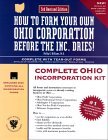
Incorporate business in U.S. |
 | ||
|
| |||
What Is Sole Proprietorship?The sole proprietorship is an unincorporated business that has only one owner. It is the least complicated and least regulated business organization model. The sole proprietorship is a simple pass-through entity; profits and losses pass through the business and are reported on the tax return of the owner/sole proprietor.Just as the sole proprietorship does not pay taxes directly, it also does not shelter the owner/proprietor from potential creditors, obligations or judgments. In the eyes of the law, the sole proprietorship and its owner are one in the same. The owner is liable for any action that is brought against the sole proprietorship that is his or her business. Although there may be no papers that need to be filed, in order for the business owner to declare his or her business a sole proprietorship, depending on the home state, there will be the same licenses, permits, sales tax numbers, etc., that are required of any business. The simplicity of the sole proprietorship is also its major fault. Without the formality of other types of business organization, it is common for sole proprietors to commingle their business and personal bookkeeping. On one level, this commingling is invited, because losses in the business can sometimes be used to offset profits that come into the family from other sources. But this offsetting can still be used when completely separate books are kept, for the business and for the family, and that is the model that should be adopted by any sole proprietor. In addition, there are a number of other limitations to a sole proprietorship, which should be considered before this form of business organization is implemented: Obviously, the lack of paperwork and low cost of setting up a sole proprietorship can be attractive to many potential business owners. But there are clearly drawbacks that should be weighed against the lure of simplicity. INCORPORATE NOW!
Want more information about registering a company? Visit our Guide. Check out incorporation fees by each state. Tip: Did you know that Delaware and Nevada are top two incorporation states? Ready to register a company? Choose one of these great online incorporators: Business Filings The Company Corporation My Corporation (Intuit®) |
Advertisement |
||
©2026 Incorporate America.com, Form a Company informational site. About Privacy Site map Information here does not constitute a legal advice. Please contact an attorney or accountant for specific expertise.
| |||
what is sole proprietorship?


